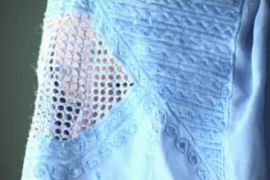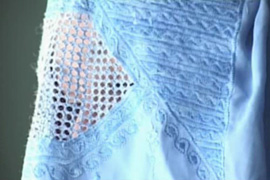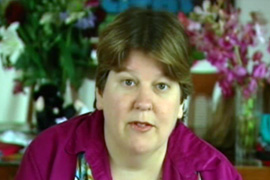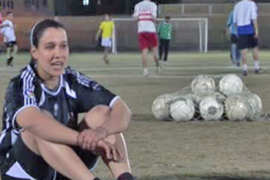
Women of Afghanistan
Six years since the fall of the Taliban, have things improved for Afghan women?
 |
| Have women been ‘liberated’ – or are they still prisoners of a backwards society? |
Under the Taliban, the women of Afghanistan were seen as victims of oppression, banished to their homes, unable to work or even to receive an education.
The US-led invasion of 2001 was supposed to have changed all that. Women now have seats in parliament and a new constitution enshrines equal rights for all.
Have Afghan women been ‘liberated’ – or are they still prisoners of a backwards society?
Sadly, our investigation reveals precious little progress in the new democracy. In a country where 57 per cent of women are married under the age of 16 and only 10 per cent of women can read and write, education is often seen as the key to empowering the next generation.
Whilst the nation’s schools have emerged as part of that solution, they have also become the battlefield in the fight for women’s rights. Education has become a perilous business for both teachers and pupils.
Afghanistan’s population is divided disproportionately into urban and rural. The young urbanites in Kabul are busy embracing every opportunity that comes their way. Education, public life … and shopping.
Meanwhile the situation for women in urban areas bears little relation to the rest of Afghanistan’s remote rural areas where 80 per cent of the country’s population live.
Here women face the highest rate of maternal mortality in the world. Every 30 minutes an Afghan woman dies in childbirth. Few health clinics are able to provide the care needed to prevent hundreds dying every year from problems during labour.
And amidst all this, there is also a hidden enemy called Opium. Drug addiction is on the increase among women and in the absence of modern medicine, it is widely used as a painkiller. Mothers give it to children to stop them crying and to help them sleep.
Women themselves were hopeful for change when President Kharzi said that 25 per cent of the seats would be reserved for women when Afghanistan’s first parliament was sworn in December 2005. So far that is not the case.
Campaigners say the focus on women’s issues like addiction, maternal mortality and violence have been lost amidst concern for the increasing security threat from conservative forces and the war against drug trafficking.
So why has the situation not changed for the better for a large proportion of the female population?
Shiulie Ghosh is joined from Kabul by Massouda Jalal, a fomer minister for women, and Horia Mossadeq, from the Human Rights Research and Advocacy Consortium. [Footage courtesy of IRIN News]
The Diva Diaries
 |
| Rebecca Lipkin has been diagnosed with a very rare form of Breast Cancer |
Now this next story is a very personal one for us here at Everywoman.
Rebecca Lipkin is Al Jazeera’s executive producer in London. She has just been diagnosed with a very rare form of breast cancer.
It is called Inflammatory Breast cancer, and it is extremely aggressive, with a lower survival rate then other kinds of breast cancer.
Frighteningly, it does not show up through mammogram screening and cannot even be felt because the cancer does not cause lumps.
Rebecca is getting treatment and she has bravely decided to share her journey with us, through a series of video diaries.
She calls herself the Cancer Diva and she will be charting her progress every month.
If you are dealing with something similar, do get in touch with us at everywoman@aljazeera.net
Signs and symptoms of inflammatory breast cancer include:
A breast that appears red, purple, pink or bruised
A tender, firm and enlarged breast
A warm feeling in the breast
Itching of the breast
Pain
Ridged or dimpled skin texture, similar to an orange peel
Thickened areas of skin
Enlarged lymph nodes under the arm, above the collarbone or below the collarbone
Flattening or retraction of the nipple
Swollen or crusted skin on the nipple
Change in color of the skin around the nipple (areola)
It is easy to confuse the signs and symptoms of inflammatory breast cancer with those of a breast infection (mastitis). Breast infections occur most often in younger women who are breast-feeding. Breast infections cause a fever, and they are easily treated with antibiotics. On the contrary, inflammatory breast cancer does not typically cause a fever, nor does it respond to antibiotics.
Please visit these websites for more information:
http://www.breastcancercare.org.uk/content.php?page_id=3982
*Al Jazeera is not responsible for external content
Egypt –Bending it like Beckham
 |
| Women’s football has been getting more popular around the Middle East |
Men’s football is always high profile, there cannot be anyone who has not heard about David Beckham moving to the US recently. But stand by to hear much more about women’s football, particularly across the Middle East.
The women’s game has been getting more popular and more respected, even though some conservatives do not like the idea.
Thanks to pioneers like coach Sahar Al Hawari, not only are women successfully playing at international level, but they are also refereeing the game.
Watch this episode of Everywoman here:
Part 1:
Part 2:
This episode of Everywoman aired from 26 July 2007.
To contact us click on ‘Send your feedback’ at the top of the page
Watch Al Jazeera English programmes on YouTube
Join our debates on the Your Views page